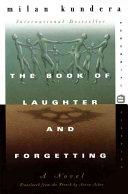Quotes from book
The Book of Laughter and Forgetting

The Book of Laughter and Forgetting is a novel by Milan Kundera, published in France in 1979. It is composed of seven separate narratives united by some common themes. The book considers the nature of forgetting as it occurs in history, politics and life in general. The stories also contain elements found in the genre of magic realism.
Part Four: Lost Letters (p. 106)
Source: The Book of Laughter and Forgetting (1979)
Context: The proliferation of mass graphomania among politicians, cab drivers, women on the delivery table, mistresses, murderers, criminals, prostitutes, police chiefs, doctors, and patients proves to me that every individual without exception bears a potential writer within himself and that all mankind has every right to rush out into the streets with a cry of "We are all writers!"
The reason is that everyone has trouble accepting the fact that he will disappear unheard of and unnoticed in an indifferent universe, and everyone wants to make himself into a universe of words before it's too late.
Once the writer in every individual comes to life (and that time is not far off), we are in for an age of universal deafness and lack of understanding.
“Love is a continual interrogation. I don’t know of a better definition of love.”
Variant: ... because love is continual interrogation. I don't know of a better definition of love.
Source: The Book of Laughter and Forgetting
“The history of music is mortal, but the idiocy of the guitar is eternal.”
Source: The Book of Laughter and Forgetting
“Joking is a barrier between man and the world. Joking is the enemy of love and poetry.”
Source: The Book of Laughter and Forgetting
“[W]e must never allow the future to collapse under the burden of memory.”
Source: The Book of Laughter and Forgetting
“The struggle of man against power is the struggle of memory against forgetting”
Source: The Book of Laughter and Forgetting
“People are always shouting they want to create a better future. It's not true.”
Part I: Lost Letters (p. 22)
The Book of Laughter and Forgetting (1979)
Context: People are always shouting they want to create a better future. It's not true. The future is an apathetic void of no interest to anyone. The past is full of life, eager to irritate us, provoke and insult us, tempt us to destroy or repaint it. The only reason people want to be masters of the future is to change the past. They are fighting for access to the laboratories where photographs are retouched and biographies and histories rewritten.
Part I: Lost Letters (p. 22)
The Book of Laughter and Forgetting (1979)
Context: People are always shouting they want to create a better future. It's not true. The future is an apathetic void of no interest to anyone. The past is full of life, eager to irritate us, provoke and insult us, tempt us to destroy or repaint it. The only reason people want to be masters of the future is to change the past. They are fighting for access to the laboratories where photographs are retouched and biographies and histories rewritten.